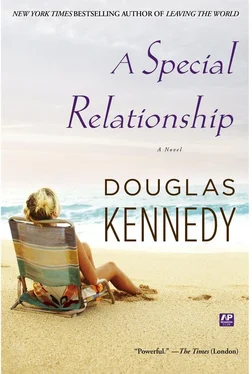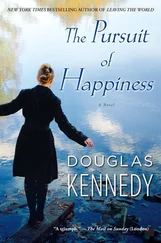I was now rigid with shock.
'Can they legally do that?' I managed to say.
'If the hearing goes their way and they make an application...'
He broke off. I said, 'Finish the sentence, Mr Clapp'.
'I'd really rather...'
'Finish the sentence'.
On the other end of the line, I could hear him take a deep steadying breath before saying, 'If the hearing goes their way - if they convince the judge that you are an unfit mother and an ongoing danger to your son - then you will have no say in the matter. They can take your son wherever they want to take him'.
Thirteen
'THE ISSUE HERE', Maeve Doherty said, 'comes down to one central question: where does the child best belong? That's what the court will be deciding - and because there have already been two legal decisions made in favour of the child's father, it's going to be our job to convince the judge that, at the very least, the child's best interests are served by joint residence between his mother and father, preferably with him spending more time with his mother'.
'But if Tony wins residence?' I asked.
'Then you'll have no say about where the child lives with his father', Maeve said. 'So if - as your husband's solicitors have indicated - he and his new partner are planning to settle in Sydney for several years, then they can most certainly take him there, even if you do object to being so geographically separated from your son. Naturally, should this happen, we can argue, and probably win you, visiting rights - but that will hardly be satisfactory. Unless, of course, you're willing to move to Australia'.
'Without a visa or a job? Sure'.
'Well, hopefully that won't come to pass. The problem here, however, is that two court orders have indicated that you could be considered an unfit mother, and that your alleged behaviour after the child's birth indicated that the child could potentially be harmed by you. Which is what they are going to argue again. Now we can certainly call a variety of professional witnesses who can both vouch for your mental stability, your fitness as a mother, and the fact that you were suffering from clinical depression at the time. How many statements do we have now, Nigel?'
'Eight altogether', he said. 'And... uhm... they're all very favourably disposed towards Ms Goodchild'.
'Which means we can count on eight favourable witnesses. The big sticking point, however, is the CAFCASS report. The court always pays attention to this report. It inevitably wields a considerable amount of influence on the final decision - as it can only be commissioned by the court, and it's also looked upon as the definitive statement on the case from the Social Services. Which is why I'm rather worried about this report. Because it doesn't come down firmly on your side, Sally. You concur with my worries, don't you, Nigel?'
We were sitting in Nigel's office. It was two days after the bombshell letter had arrived from Tony's solicitors, announcing his intentions to move to Australia. Though she was trying to juggle around four briefs at the same time, Maeve Doherty considered the situation serious enough to find a free hour to get down to Balham for a meeting with the three of us. Which is how I found myself making only my second visit to Nigel Clapp's office since he had started representing me.
'Uhm... in my experience', Nigel said, 'if the CAFCASS report doesn't challenge the status quo, the court will usually allow the status quo to be maintained. Which... uhm... I'm afraid to say might mean that residence will be granted to your husband, but with more generous and unsupervised visiting privileges. Which still means that they can take him to Australia. So, uhm, I'm in agreement with Ms Doherty... we need to strive for some sort of joint residence arrangement...'
'But Nigel', Maeve said, 'the problem here is not having any real ammunition against either Tony or his partner. Unless your "detective" has turned up something'.
Nigel almost managed a small embarrassed smile at the mention of his 'detective'.
'Shall I bring her in here to see what she's managed to uncover?' he said.
'Your detective's a she?' I asked.
Nigel started to blush.
'It's... uhm... Mrs Keating'.
'You're kidding me?' I said, then suddenly saw that this comment made him anxious.
'She's really rather good at it', he said.
'I can confirm that', Maeve said.
'Sorry, sorry', I said. 'I didn't mean to imply...'
'Why don't you get her in here?' Maeve said.
Nigel reached for the phone and dialled a number. From next door, we could hear Mrs Keating answer her phone with a loud, 'Yeah?'
'Would you mind coming in here for a moment, Rose - and could you please bring the Goodchild file with you'.
'Oh, yeah, right'.
She showed up a moment later. As she came in, I noticed brownish crumbs on her large floral dress. The remnants of bourbon creams, no doubt. Nigel re-introduced us. Though she had let me into the office only ten minutes earlier, she still looked at me as if I was some stranger whom she had never laid eyes on before. Nigel said, 'Ms Goodchild and Ms Doherty would like to hear the results of your investigation into Ms Dexter'.
'You want to read the report, or you want me to give you the condensed version?' she asked.
'Let's... uhm... hear the condensed version, then we can make photocopies for both of them of your report'.
'Fine by me', she said parking herself in a chair, and opening the file. 'Got all her specs here. Diane Dexter, born Leeds, 15 January 1953. Father worked for the local Gas Board, Mum was a housewife. She went to the local grammar school, a state primary. Bright girl - won a place at Leeds University in Economics. Went to London after getting her degree. Ten years in advertising. Worked for some big firms - including Dean Delaney, and John Hegarty. Then got headhunted by Apple UK to run their marketing division. Five years with them. Branched into market research. Co-founded a company - Market Force Ltd - in 1987 with a partner named Simon Chandler, with whom she was romantically linked for a time. When they broke up in 1990, he bought out her share of the firm, which she used to set up Dexter Communications, which has become super-successful over the last ten years, to the point where she's now worth around £10 million, with houses in... well, you know all that from the earlier Lawrence and Lambert report in the file.
'Now, here's what little dirt I could find on her. Two month's hospitalization in 1990 at the Priory for "psychotropic dependence" - better known as cocaine misuse. The bad news is that there were no arrests for drug possession, in fact nothing criminal whatsoever, bar a couple of points on her driving licence for speeding. And she's been totally clean since the Priory stint in '90. In fact, she's actually given talks to youth groups about her past addiction, and has also raised money for a charity that sponsored drug education programmes in and around Leeds'.
Great, I thought. A reformed druggie who's remained clear for thirteen years - and now does good charitable work as a way of making amends for her wayward past. Oh, and she's wildly successful and rich to boot.
'The cocaine angle is an interesting one', Maeve Doherty said. 'There might be something there. Anything else?'
'Besides the relationship with Simon Chandler, there have been two failed marriages: a two-year quickie to a chap she married out of university, and whom she divorced in '75. He's now a schoolteacher somewhere in Yorkshire. Then there was a six-year stint with a television director named Trevor Harriman, which ended when she met Simon Chandler in '85. In fact, Chandler was named as co-respondent in the divorce petition by her erstwhile husband. Since she and Chandler parted company in 1990, there have been a few affairs - including one with that thriller writer fellow, Philip Kimball, but nothing solid. Until she met Tony Hobbs in 1999'.
Читать дальше












